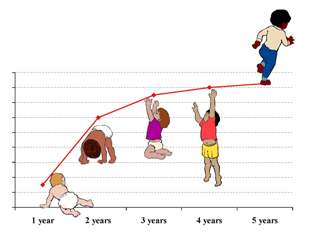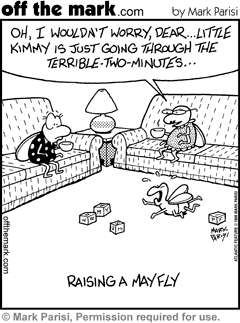Study Guide for Childhood Development |
||
 Jean Piaget's Four Stages of Child Development
1. Sensorimotor Stage (0-2 yrs) -child heavily relies on innate motor responses -accomplishes at end of stage:
2. Preocupational Stage (2-6 yrs) -marked by well-developed mental representations & use of language
-accomplishes at end of stage:
3. Concrete Operational Stage (7-12 yrs) -understands conversvation, but unable to employ abstract thinking -accomplishes at end of stage:
4. Formal Operational Stage (12+ yrs) -ability to use abstract & hypothetical thinking
**Note: Piaget criticized because he used his own children as basis of study; children mature earlier than Piaget thought (Gulya, 1990)
 Sigmund Freud's Psycho-Sexual Development
I. Oral (0-2 yrs) -explore world through sensation -find pleasure in their mouth II. Anal (2-3 yrs) -learn to control bodily functions -personality development -anal retintive: orderly, stubborn -anal explosive: unorganized, carefree III. Phallic (4-7 yrs) -gender differiation -Oedipus/Electra Complexes IV. Latent (8-12 yrs) -hide sexuality V. Genital (13+ yrs) -aware of body & sexual desires  Mary Ainsworth's Attachment Theory
1. Avoidance Attachment -infant won't return to mother after exploring 2. Secure Attachment -infant explores but returns to mother for comfort, then ventures off again 3. Resistance Attachment -infant explores, returns to mother seeking comfort but becomes distressed 4. Insecure Attachment -infant will not explore & cannot leave mother (home-base)
 Parenting Styles
Authoritarian -lots of rules -no leeway -parents in charge
Authoritative -rules set -some leeway -more democratic but parents still in charge
Permissive -no or few rules -all leeway -children have say-so  |
Erik Erikson's Stages of Child Development
1. Trust vs. Mistrust (0-1 yrs) -appreciation of interdependence & relatedness [hope] 2. Autonomy vs. (Shame &) Doubt (2-3 yrs) -acceptance of self-control & self-assertion [will] 3. Intiative vs. Guilt (3-6 yrs) -ability to begin task & feel a sense of purpose [purpose] 4. Industry vs. Inferiority (6-12 yrs) -acceptance of one's course & competition with others [competence] 5. Identity vs. Role Confusion (13-19 yrs) -develop sense of self and personal identity [social relationships] Early Adulthood
6. Intimacy vs. Isolation -form loving and intimate relationships [relationships] Adulthood
7. Generativity vs. Stagnation -need to create or nuture things that will outlast them [work & parenthood] Elders
8. Integraty vs. Despair -look back on life and feel sense of accomplishment [reflection on life] Key Terms
 Kohlberg: Morality
I. Pre-Conventional 1. Right v. Wrong = based on punishment 2. Right v. Wrong = Needs
II. Conventional 3. Right v. Wrong = Approval from Society 4. Right v. Wrong = based on what Authority says
III. Post-Conventional 5. Right v. Wrong = based on what is just (Civil Disobedience) 6. Right v. Wrong = Universal Morality
**Note: Gillian-Proposed notion that females make moral decisions based on relationships & maintaining those relationships  Donald Super's Career Development
1. Growth Stage (0-14 yrs) -think of possibilities 2. Exploration Stage (15-24 yrs) -exploring interests 3. Establishment Stage (25-44 yrs) -figured out career & making ground 4. Maintance Stage (45-65 yrs) -steer the course of career 5. Decline Stage (65+ yrs) 
Brain Development - Myth or Fact?Myth At birth the brain is fully developed, just like one's heart or stomach. Fact - Most of the brain's cells are formed before birth, but most of the connections among cells are made during infancy and early childhood. Myth The brain's development depends entirely on the genes with which you are born. Fact - Early experience and interaction with the environment are most critical in a child's brain development. Myth A toddler's brain is less active than the brain of a college student. Fact - A 3-year-old toddler's brain is twice as active as an adult's brain. Myth Talking to a baby is not important because he or she can't understand what you are saying. Fact - Talking to young children establishes foundations for learning language during early critical periods when learning is easiest for a child. Myth Children need special help and specific educational toys to develop their brainpower. Fact - What children need most is loving care and new experiences, not special attention or costly toys. Talking, singing, playing and reading are some of the key activities that build a child's brain. |
|
